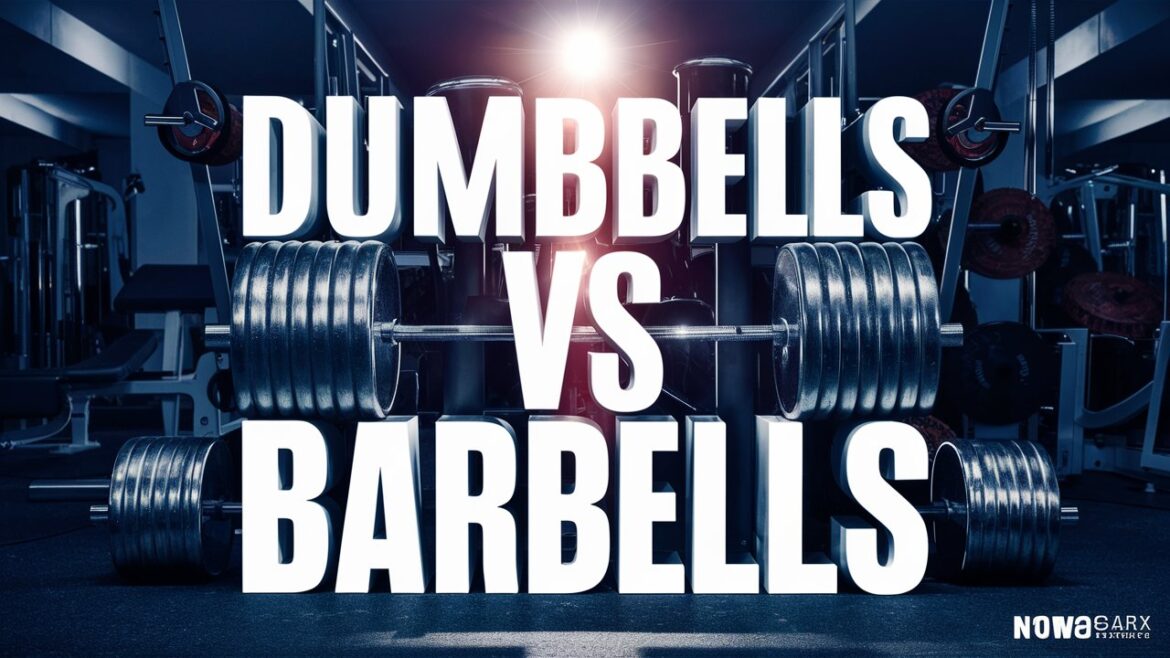Read Quick Answer:
Dumbbells and barbells both have their advantages with regard to strength building. One side of the coin, you get dumbbells. Versatile equipment allows for balance in between the muscles.
Coming to the other side will be barbells which could be used with heavier weight appropriately to exercise the body as a whole with compound movements.
Introduction
Having strength would not only develop those muscles but would enhance one’s health along with the physical performance level. Now, one of the most good question areas in this context is dumbbells and barbells for accomplishing the same.
This blog will serve in showcasing the differences between the two tools, the advantages of using either of them in particular cases, and the cons along with the cases where one can prove more effective than the other.
Knowing the Basics
What are Dumbbells?
Dumbbells are short bars ending with weights, mainly used in pairs. Indeed, they are universal tools that would present themselves even in a modest gym, be it a home or a hotel gym. Dumbbells will do most exercises against upper and lower body muscles.
What are Barbells?
Barbells are long bars with weights attached at the end. They are meant for compound exercises that require movement by more than a single muscle group.
Barbells are fundamental in weight lifting and are majorly used for squats, deadlifts, and bench presses.
Comparison between Dumbbells and Barbells
Versatility and Accessibility
Dumbbell
- Upper body: bicep curls, shoulder presses, chest flies
- Lower body: lunges, goblet squats, deadlifts
- Russian twists, dumbbell side bends, weighted sit-ups
Barbell
- Compound Exercises: squats, deadlifts, bench presses.
- Isolation Movements: barbell curls, skull crushers, barbell rows.
Convenience and Availability
Home Gym considerations
- Dumbbells occupy limited space, and most of the time, they are less expensive.
- Barbell occupies more space with additional accessories or equipment like racks or benches.
Equipment Available in the Gym
- Almost every gym has a good number of dumbbells and barbells. So there can be different exercises possible with both.
Ease of Use and Safety for Newcomers
Dumbbells
- More accessible to learn and easier to manage, hence less chance of injury.Hence, this will be the best weight to commence strength training for novices.
Barbells
- Needs proper form and technique not to get hurt Requires a trainer or spotter
Advanced Training Techniques
Progressive Overload
- Can be performed using both dumbbells and barbells.
- Focuses on progressively increasing the weight and intensity to build strength.
High-Intensity Training
Intended for advanced lifters who want to train at the most intense level.
Effectiveness in Building Stamina and Strength
Dumbbells for Muscle Imbalance Detection
- Helps determine and correct muscle imbalances.
- Allows for unilateral training, which balances strength on both sides of the body.
Barbells for Maximum Intensity
- Enables lifting heavier weights for effective strength gains.
- Best suited for powerlifting and bodybuilding.
Functional Training
Everyday Movements
-
Dumbbells
Useful for exercises that mimic daily movements.
-
Barbells
Provide overall functional strength.
Sport-Specific Training
- Barbells
Often used in sports-specific training for Olympic lifting and powerlifting skills.
Pros and Cons
Dumbbells
-
Pros:
- Greater range of motion.
- Better muscle mobilization.
- Highly versatile.
-
Cons:
- Limited range of motion (ROM).
- Requires more stabilization, which can be challenging.
Barbells
-
Pros:
- Can hold heavier loads.
- Greater potential for strength gains.
- Best for compound exercises.
-
Cons:
- Requires more space and additional equipment.
- Incorrect technique increases injury risk.
Which One to Use
Goal of Fitness and Your Experience
-
Best for Beginners:
Dumbbells are ideal for beginners due to their ease of use and lower risk of injury.
-
Advanced Lifters:
Barbells are beneficial for elite powerlifters aiming to increase strength and muscle size.
-
Specific Training Goals:
Muscle Building: Both dumbbells and barbells are effective, but barbells allow for heavier lifting.
Endurance Training: Dumbbells are preferable due to their versatility and suitability for higher repetitions.
FAQs
What’s better to build muscle: dumbbells or barbells?
Well, both do the trick, but with barbells, one can lift heavier things, while with dumb-bells, one can balance the weight.
Can a complete beginner make use of the barbell to lift safely?
Well, absolutely, but one should get proper training or someone who knows how to spot.
How do dumbbells help in correcting muscle imbalance?
This is so because dumbbells allow one to train unilaterally, working each side independently.
What would be the best exercises performed with a barbell?
The best of all are squats, deadlifts, bench presses, and rows.
What are usually the better choices for a home gym: dumbbells or barbells?
Generally, the best choices are dumbbells as these allow greater versatility and take up much less space than a whole barbell set.
conclusion
Ultimately, what’s at stake with this decision on getting dumbbells or barbells is your goals, experience, and space. Each brings with it varying benefits that could be put into action toward most common goals of a strength training routine.
Now that you know how they differ, you can make a better and more informed decision on how to focus your exercise routine.

